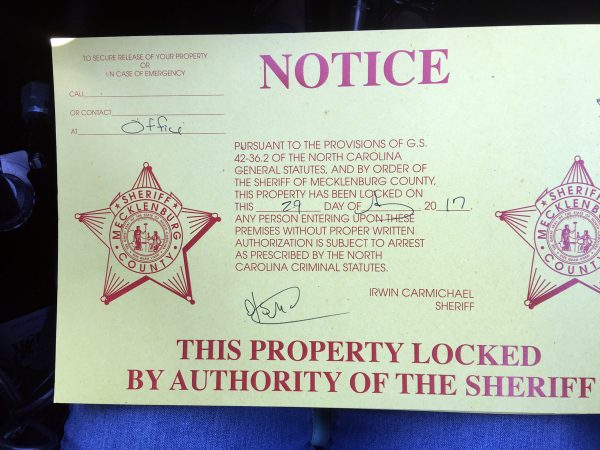Project documenting evictions’ toll in Mecklenburg wins national award

Tens of thousands of people a year are evicted in Mecklenburg County, but the full impact is hard to see.
Court data on evictions is often incomplete or accessible only in paper files, difficult to compile and access. Demographic data on who is evicted, and for what reasons, is not comprehensively collected. There’s little tracking of where people go once they’been evicted, and how – or if – they cope.
A 2017 project by the UNC Charlotte Urban Institute and Mecklenburg County sought to change that. For the first time, by combining data from the court system, Sheriff’s Office and thousands of eviction cases filed on paper that were collected and processed by volunteers, a complete picture of evictions in Mecklenburg began to emerge.
This year, the National Neighborhood Indicators Partnership selected the Urban Institute and Mecklenburg County as winners of the annual G. Thomas Kingsley Impact Award, in recognition of the eviction project.
“Their efforts to analyze and report on eviction data inspired many to act and change local policies and spending. Mecklenburg County allocated funding for the first time for legal assistance for residents facing eviction; a group of CEOs sponsored non-profits to attend eviction prevention training; banks donated their legal staff’s time to represent tenants facing eviction; and local philanthropy continues to keep attention on the issue by convening a citywide working group on the issue,” NNIP officials wrote.
Mecklenburg County allocated $300,000 to legal representation services for people facing eviction, for the first time, in fiscal 2019. Legal Aid of North Carolina also developed a fact sheet detailing tenant rights to go with every eviction served, since many tenants did not know what their rights were – or that they even had any.
“UNC Charlotte’s reports inspired Mecklenburg County government, businesses, and philanthropy to act and change local policies and spending,” the NNIP wrote.
|
LEARN MORE ABOUT EVICTION UNC Charlotte Urban Institute research:
Inside the world of evictions in Charlotte: ‘This is a symptom of a greater problem’ NATIONAL EVICTION DATA In April scholar Matthew Desmond debuted a national database of eviction data, 83 million court records dating to 2000. His data ranked North Charleston, S.C., atop a list of 100 U.S. cities in the rate of eviction judgments. Greensboro, N.C., and Columbia, S.C. were also in the top 10. Charlotte was 21st. |
For decades, eviction was a problem that was not widely studied. But evictions have been gaining more attention since the publication of Princeton professor Matthew Desmond’s best-selling 2016 book “Evicted: Poverty and Profit in the American City.” Being evicted is not just a temporary setback for many people, or an obstacle that is easily overcome.
Instead, it can set whole families back years, causing people to lose jobs due to missed time spent looking for a new place to live and wiping out meager savings through expenses such as storage fees and replacing lost furniture. Children are sometimes forced to switch schools midyear, and families with an eviction on their record often find it difficult to locate another landlord who will rent to them, even if they’re able to save up enough money for a deposit and application fees.
As Desmond puts it in his Eviction Lab project: “The evidence strongly indicates that eviction is not just a condition of poverty, it is a cause of it.”
Among the UNC Charlotte Urban Institute project’s findings:
- 2,373 eviction cases a month, on average, were filed in Mecklenburg County.
- 84 percent of tenants were not present at the small claimes court trial during the month volunteers tracked every eviction proceeding.
- In contrast, 82 percent of landlords had legal representation in court.
- Neighborhoods with the highest eviction rates tended to be largely African-American, indicating a disparate impact of the eviction system.
- The average rent owed by tenants facing eviction was $1,044.
The National Neighborhood Indicators Partnership is a collaboration led by the national Urban Institute and local groups throughout the US that gather data and use data to inform local policymaking and community-building.